
Seirarctia is a monotypic moth genus in the subfamily Arctiinae erected by Alpheus Spring Packard in 1864. Its single species, Seirarctia echo, the echo moth, was first described by James Edward Smith in 1797. It is found in North America, where it has been recorded from Georgia, Florida, Alabama and Mississippi. The habitat consists of thickets, scrubwoods and open areas.
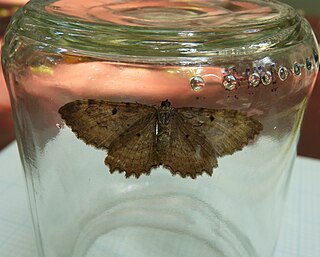
Coryphista is a monotypic moth genus in the family Geometridae erected by George Duryea Hulst in 1896. The genus may be considered to be a synonym of Rheumaptera. Its only species, Coryphista meadii, the barberry geometer moth or barberry looper, was first described by Alpheus Spring Packard in 1874. It is found in the United States and southern Canada.

Digrammia was a genus of moths in the family Geometridae erected by Carl Freiherr von Gumppenberg in 1887. It is now often considered a synonym of Semiothisa.

Eumacaria is a monotypic moth genus in the family Geometridae described by Packard in 1873. Its only species, Eumacaria madopata, the brown-bordered geometer moth, was first described by Achille Guenée in 1857. It is found in North America, where it has been recorded from British Columbia, northern Washington, southern Saskatchewan, from Maine to Florida, South Dakota, North Dakota, Nebraska, Wyoming, Idaho, Colorado and New Mexico. The habitat consists of orchards and shrublands. The species is listed as threatened in Connecticut.
Eurhinosea is a monotypic moth genus in the family Geometridae. Its only species, Eurhinosea flavaria, is found in western North America. The genus and species were both described by Packard in 1873.

Digrammia irrorata is a moth of the family Geometridae first described by Alpheus Spring Packard in 1876. It is found in the western United States and south-western Canada.
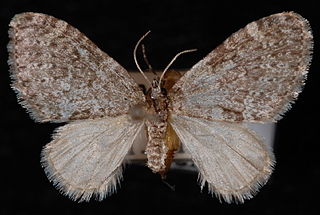
Acasis viridata, the olive-and-black carpet, is a species of moth belonging to the family Geometridae. It was described by Alpheus Spring Packard in 1873. It is found from Newfoundland to British Columbia and the adjacent northern part of the United States, south in the east to Florida, and south in the west to Colorado and Oregon.
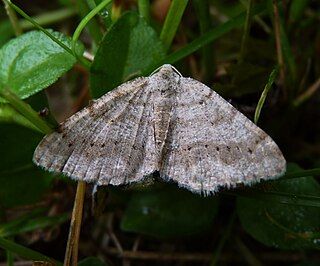
Digrammia ocellinata, the faint-spotted angle or locust looper, is a moth of the family Geometridae. The species was first described by Achille Guenée in 1857. It is found in the eastern United States, Quebec and Ontario.

Nepytia umbrosaria is a moth of the family Geometridae first described by Alpheus Spring Packard in 1873. It is found in North America, including Arizona, British Columbia, California, Oklahoma, Oregon and Washington.
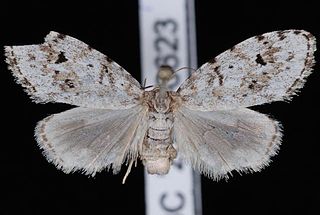
Clemensia albata, the little white lichen moth, is a moth of the family Erebidae. It was described by Alpheus Spring Packard in 1864. It is found in eastern North America, west across boreal Canada to south-eastern British Columbia. The range extends along the Pacific Coast south to Monterey Bay in west-central California. The habitat consists of moist forests, including coastal rainforests, oak woodlands and mixed hardwood forests.

Pyrausta unifascialis, the one-banded pyrausta, is a moth in the family Crambidae. It was described by Alpheus Spring Packard in 1873. It is found in North America, where it has been recorded from Quebec west to British Columbia, south to Arizona and California. The habitat consists of forest openings, clearings and fields.

Macaria minorata, the minor angle moth, is a moth of the family Geometridae. The species was first described by Alpheus Spring Packard in 1873. It is found in North America, where it has been recorded from Nova Scotia to Ontario, Quebec, Minnesota, New England, Maryland, North Carolina, South Carolina and Georgia.
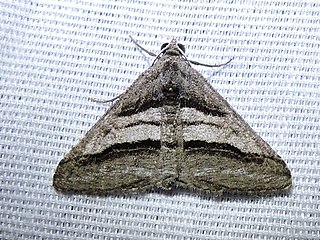
Digrammia atrofasciata is a species of geometrid moth in the family Geometridae. It was described by Alpheus Spring Packard in 1876 and is found in North America.
Digrammia pertinata is a species of geometrid moth in the family Geometridae. It is found in North America.
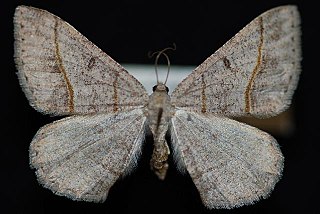
Digrammia neptaria, the dark-bordered granite, is a species of geometrid moth in the family Geometridae. It is found in Central America and North America.

Digrammia muscariata is a species of geometrid moth in the family Geometridae. It is found in North America.

Digrammia decorata, the decorated granite, is a species of geometrid moth in the family Geometridae. It is found in North America.
Digrammia cinereola is a species of moth in the family Geometridae first described by George Duryea Hulst in 1896. It is found in North America.

Digrammia nubiculata is a species of geometrid moth in the family Geometridae. It is found in North America.
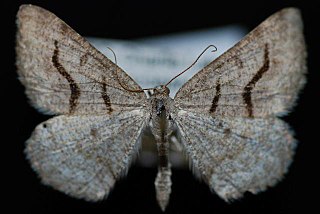
Digrammia rippertaria, the northern granite, is a species of geometrid moth in the family Geometridae. It is found in Europe and Northern Asia and North America.
















